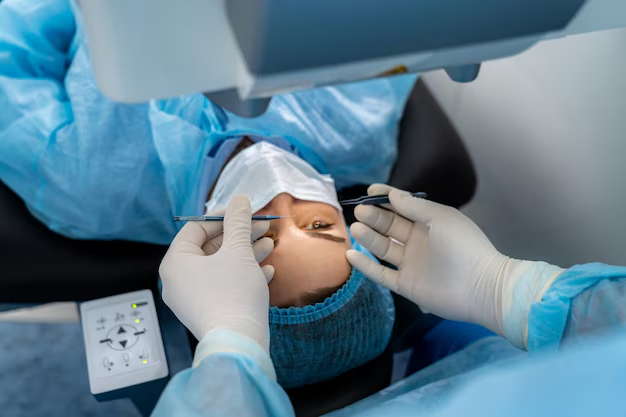Your Guide to Do You Get Put To Sleep For Cataract Surgery
What You Get:
Free Guide
Free, helpful information about Cataract FAQ and related Do You Get Put To Sleep For Cataract Surgery topics.
Helpful Information
Get clear and easy-to-understand details about Do You Get Put To Sleep For Cataract Surgery topics and resources.
Personalized Offers
Answer a few optional questions to receive offers or information related to Cataract FAQ. The survey is optional and not required to access your free guide.
Understanding Anesthesia for Cataract Surgery: What To Expect
Cataract surgery is one of the most common and successful eye surgeries worldwide, known for restoring vision impaired by cloudy lenses. Yet, a common question many have is, "Do you get put to sleep for cataract surgery?" Let's dive into the details of anesthesia options for cataract surgery and explore everything you need to know before the procedure.
🌟 The Nature of Cataract Surgery
Cataract surgery involves removing the cloudy lens of the eye and replacing it with a clear artificial lens. It's a relatively quick and routine outpatient procedure that typically takes about 10 to 20 minutes. Given its minimally invasive nature, the type of anesthesia used is often tailored to maximize patient comfort while ensuring safety.
Types of Anesthesia
Local Anesthesia:
- The most common choice for cataract surgery.
- Involves numbing the eye with drops or an injection.
- Patients remain awake and aware but experience no pain in the eye.
Sedation:
- Often used alongside local anesthesia.
- Provides relaxation, helping alleviate anxiety.
- Typically, a mild sedative is given intravenously.
General Anesthesia:
- Rarely used for cataract surgery.
- Patients are put to sleep during the surgery.
- Reserved for special cases, such as patients with extreme anxiety or certain medical conditions.
🏥 Local Anesthesia: The Preferred Method
Local anesthesia is the go-to for cataract surgeries due to its efficacy in numbing the eye while minimizing risks. Here’s why it’s favored:
- Quick Recovery: Patients can leave the clinic shortly after the procedure.
- Minimal Side Effects: Reduces the complications associated with general anesthesia.
- Enhanced Comfort: Combined with sedation, patients usually feel relaxed without the disadvantages of being fully unconscious.
Your Experience During Surgery
When undergoing cataract surgery with local anesthesia, expect the following:
- Visuals: You'll likely see bright lights and blurry shapes but feel no pain.
- Sounds: Operating room noise might be noticeable, but sedation helps in keeping calm.
- Communication: You can communicate discomfort or anxiety, allowing the surgical team to address it promptly.
🚦 When Is General Anesthesia Used?
Though rare, there are scenarios where general anesthesia might be employed:
- Pediatric Cataract Surgery: Children often cannot remain still or calm with local anesthesia.
- Severe Anxiety Disorders: Patients unable to manage their anxiety through mild sedation.
- Unusual Medical Conditions: Certain medical conditions might contraindicate local anesthesia.
Consultation with an ophthalmologist will determine the most appropriate anesthesia type. Patients are encouraged to discuss their medical history, medications, and concerns to tailor the safest plan.
🌐 Preparing for Cataract Surgery
Preparation is key to a successful cataract surgery experience. Here's what you can do:
- Medical Assessment: Undergo a thorough pre-operative evaluation.
- Medication Management: Follow doctor's advice on continuing or pausing medications.
- Transportation: Arrange for someone to drive you home post-surgery.
Common Concerns and Questions
- Will I be fully aware? Yes, with local anesthesia, but sedation helps keep you at ease.
- What if I move my eye? The surgeon uses devices to stabilize the eye, reducing this risk.
- Can I eat before surgery? Typically, it’s advised to avoid eating or drinking several hours before, especially if sedation or general anesthesia is planned.
📋 Summary Checklist for Cataract Surgery Patients
Here's a handy list to guide you through your cataract surgery preparation:
- 💊 Discuss Medications: Review your current medications with your doctor.
- 🕒 Plan Ahead: Allocate time for rest and recovery on the day of surgery.
- 🚗 Transportation: Secure a ride home post-procedure.
- 👥 Bring a Friend: Having someone accompany you can provide reassurance and assistance.
🧐 Post-Surgery Expectations
Cataract surgery is designed to improve your vision almost immediately, but initial recovery might include:
- Blurry Vision: Temporary blurring is common right after surgery.
- Mild Discomfort: A mild itching or discomfort might persist for a day or two.
- Follow-Up: Attend all follow-up appointments to monitor healing.
When to Seek Help
While complications are rare, seek medical attention if you experience:
- Severe Pain: Beyond mild discomfort, severe pain should be evaluated.
- Vision Changes: Sudden vision changes or loss could indicate an issue.
- Infection Signs: Redness or swelling warrants a consultation.
🙌 Enhancing Recovery
Efficient recovery combines proper care and lifestyle adjustments:
- 🔅 Rest Your Eyes: Avoid strenuous activities, especially those that strain the eyes.
- 🕶 Wear Protective Eyewear: Shield your eyes from bright lights and potential irritants.
- 💧 Stick to Post-Op Drops: Use prescribed eye drops as directed to aid healing.
Concluding Insights
Cataract surgery is a transformative procedure with multiple anesthesia options tailored to patient comfort and safety. While local anesthesia coupled with mild sedation remains the standard practice, general anesthesia is reserved for specific cases. By understanding the process and preparing accordingly, patients can walk into surgery with confidence and anticipation of clearer vision.
Navigating the nuances of cataract surgery can be less daunting with the right knowledge and preparation. Consulting with healthcare providers ensures the anesthesia choice aligns with individualized needs, paving the way for a smooth surgical journey.
What You Get:
Free Cataract FAQ Guide
Free, helpful information about Do You Get Put To Sleep For Cataract Surgery and related resources.

Helpful Information
Get clear, easy-to-understand details about Do You Get Put To Sleep For Cataract Surgery topics.

Optional Personalized Offers
Answer a few optional questions to see offers or information related to Cataract FAQ. Participation is not required to get your free guide.


